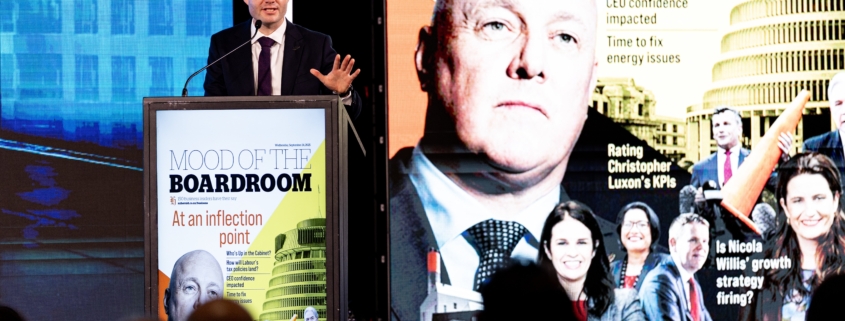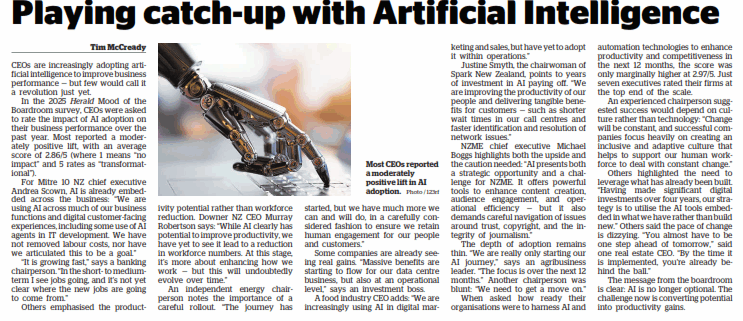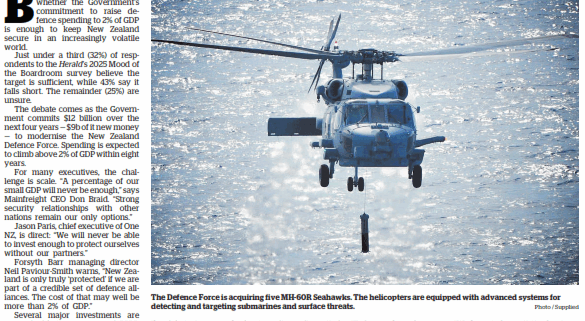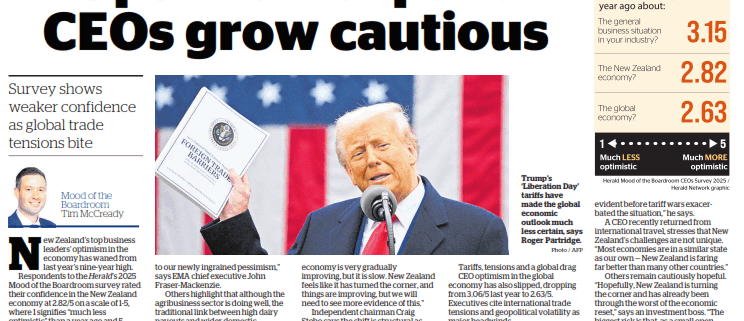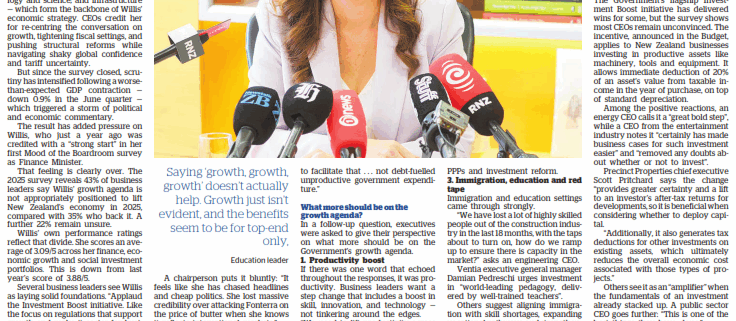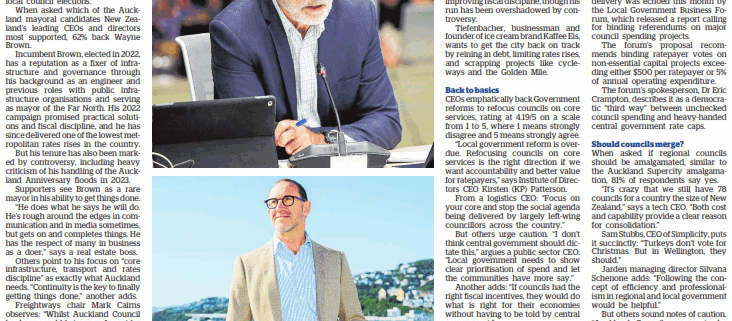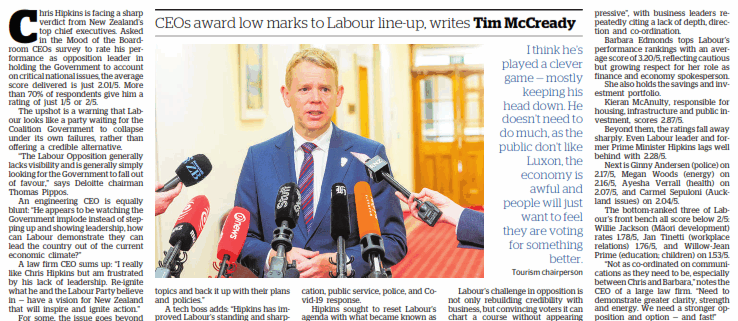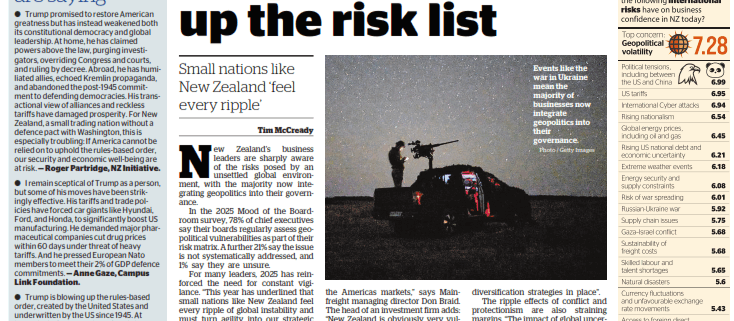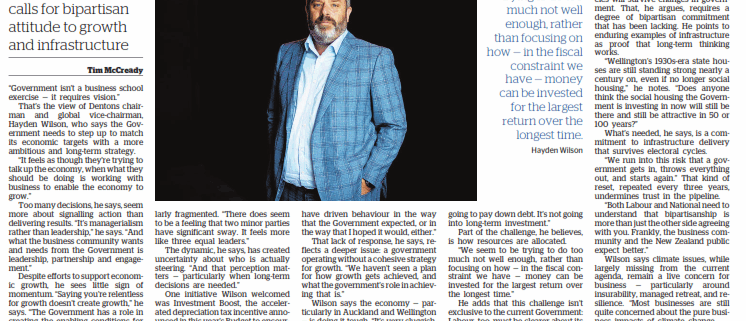Mood of the Boardroom: Playing catch-up with Artificial Intelligence (NZ Herald)
Mood of the Boardroom: Playing catch-up with Artificial Intelligence (NZ Herald)
CEOs are increasingly adopting artificial intelligence to improve business performance — but few would call it a revolution just yet.
In the 2025 Herald Mood of the Boardroom survey, CEOs were asked to rate the impact of AI adoption on their business performance over the past year. Most reported a moderately positive lift, with an average score of 2.86/5 (where 1 means “no impact” and 5 rates as “transformational”).
For Mitre 10 NZ chief executive Andrea Scown, AI is already embedded across the business: “We are using AI across much of our business functions and digital customer-facing experiences, including some use of AI agents in IT development. We have not removed labour costs, nor have we articulated this to be a goal.”
“It is growing fast,” says a banking chairperson. “In the short- to medium-term I see jobs going, and it’s not yet clear where the new jobs are going to come from.”
Others emphasised the productivity potential rather than workforce reduction. Downer NZ CEO Murray Robertson says: “While AI clearly has potential to improve productivity, we have yet to see it lead to a reduction in workforce numbers. At this stage, it’s more about enhancing how we work — but this will undoubtedly evolve over time.”
An independent energy chairperson notes the importance of a careful rollout. “The journey has started, but we have much more we can and will do, in a carefully considered fashion to ensure we retain human engagement for our people and customers.”
Some companies are already seeing real gains. “Massive benefits are starting to flow for our data centre business, but also at an operational level,” says an investment boss.
A food industry CEO adds: “We are increasingly using AI in digital marketing and sales, but have yet to adopt it within operations.”
Justine Smyth, the chairwoman of Spark New Zealand, points to years of investment in AI paying off. “We are improving the productivity of our people and delivering tangible benefits for customers — such as shorter wait times in our call centres and faster identification and resolution of network issues.”
NZME chief executive Michael Boggs highlights both the upside and the caution needed: “AI presents both a strategic opportunity and a challenge for NZME. It offers powerful tools to enhance content creation, audience engagement, and operational efficiency — but it also demands careful navigation of issues around trust, copyright, and the integrity of journalism.”
The depth of adoption remains thin. “We are really only starting our AI journey,” says an agribusiness leader. “The focus is over the next 12 months.” Another chairperson was blunt: “We need to get a move on.”
When asked how ready their organisations were to harness AI and automation technologies to enhance productivity and competitiveness in the next 12 months, the score was only marginally higher at 2.97/5. Just seven executives rated their firms at the top end of the scale.
An experienced chairperson suggested success would depend on culture rather than technology: “Change will be constant, and successful companies focus heavily on creating an inclusive and adaptive culture that helps to support our human workforce to deal with constant change.”
Others highlighted the need to leverage what has already been built. “Having made significant digital investments over four years, our strategy is to utilise the AI tools embedded in what we have rather than build new.” Others said the pace of change is dizzying. “You almost have to be one step ahead of tomorrow,” said one real estate CEO. “By the time it is implemented, you’re already behind the ball.”
The message from the boardroom is clear: AI is no longer optional. The challenge now is converting potential into productivity gains.
Mood of the Boardroom: Executives divided on defence spending plan (NZ Herald)
Mood of the Boardroom: Executives divided on defence spending plan (NZ Herald)
Business leaders are split on whether the Government’s commitment to raise defence spending to 2% of GDP is enough to keep New Zealand secure in an increasingly volatile world.
Just under a third (32%) of respondents to the Herald’s 2025 Mood of the Boardroom survey believe the target is sufficient, while 43% say it falls short. The remainder (25%) are unsure.
The debate comes as the Government commits $12 billion over the next four years — $9b of it new money — to modernise the New Zealand Defence Force. Spending is expected to climb above 2% of GDP within eight years.
For many executives, the challenge is scale. “A percentage of our small GDP will never be enough,” says Mainfreight CEO Don Braid. “Strong security relationships with other nations remain our only options.”
Jason Paris, chief executive of One NZ, is direct: “We will never be able to invest enough to protect ourselves without our partners.”
Forsyth Barr managing director Neil Paviour-Smith warns, “New Zealand is only truly ‘protected’ if we are part of a credible set of defence alliances. The cost of that may well be more than 2% of GDP.”
Several major investments are earmarked between now and 2028. These include replacing the ageing Boeing 757 fleet ($600m to $1b), acquiring maritime helicopters ($300m to $600m), and enhancing strike capabilities ($100m to $300m) in addition to cybersecurity, drones, and personnel housing upgrades.
Ventia executive general manager Damian Pedreschi emphasises the need to support people as well as hardware. “Our defence force will always be small but mighty,” he says. “We need to give them the appropriate living and working facilities, and up-to-date equipment to carry out their core functions.”
Several respondents highlight that the debate is as much about credibility with allies as it is about the headline figure.
“For our allies, the commitment no doubt speaks louder than the percentage,” says Institute of Directors CEO Kirsten (KP) Patterson. “It’s a signal to friends and allies that we take our shared security seriously.”
Others stress that execution is what matters. “Chronic underinvestment needs a transformational approach,” notes ServiceNow country director Kate Tulp.
“How will Defence spend that investment at pace with the current skill sets employed? This will be the determining factor.”
Chronic underfunding is repeatedly cited. “Defence has been woefully underfunded for decades. Significant investment in innovation is essential, just look at how fast things are moving in Ukraine,” says Retirement Villages Association executive director Michelle Palmer.
Dairy Holdings chairman Greg Gent adds that catch-up capital is essential, given the lift is “off a very low base”.
Auckland Business Chamber CEO Simon Bridges calls it “the right thing” but says one could argue the timeframe is on the tardy side: “A job worth doing is worth getting on with.”
Still, not all believe New Zealand should be chasing higher figures.
“We have to be realistic about our country’s balance sheet,” says Freightways chairman Mark Cairns. “Two per cent of GDP seems a sensible lift from where we have been.” “To go from 1.2% of GDP to 2% of GDP will require $30 billion of additional cumulative funding. Where is that coming from?” asks Cameron Bagrie, managing director at Bagrie Economics.
Some are sceptical of the value of the spend.
“It’s probably one where we would be better off considering carefully our diplomatic efforts than trying to build a modern navy,” says Jarden managing director Silvana Schenone.
Mood of the Boardroom: CEOs push for an independent watchdog (NZ Herald)
Mood of the Boardroom: CEOs push for an independent watchdog (NZ Herald)
A clear majority of executives in this year’s Mood of the Boardroom survey — 61% — support the establishment of an independent institution such as a Parliamentary Budget Office to provide impartial oversight of government expenditure and fiscal policy. A quarter are opposed, while 14% remain unsure.
Supporters argue that such a body would strengthen transparency and accountability. Auckland Airport CEO Carrie Hurihanganui says: “Fiscal prudence is critical and an independent body, set up correctly and with the appropriate mandate, would add value.”
New Zealand Initiative chairman Roger Partridge notes Treasury’s fiscal updates often rely too heavily on ministerial assumptions: “That leaves voters and Parliament with projections that often look better on paper than in practice. Many OECD countries already benefit from such institutions. New Zealand should, too.”
Others believe the need arises from Treasury’s limited independence. “Treasury is not sufficiently independent from the Minister of Finance,” observes economist Cameron Bagrie. Deloitte chairman Thomas Pippos adds: “The more we can depoliticise the articulation of ‘facts’, the better we will be.”
“Yes — but don’t hire Elon,” jokes Cordis Auckland managing director Craig Bonnor.
But resistance remains. Critics argue it risks creating “more bureaucracy” when agencies should already be exercising discipline.
“We shouldn’t need a Parliamentary Budget Office as every department should already be delivering transparency and fiscal discipline,” says one CEO. “New Zealand is simply too small to keep creating more agencies to address systemic deficiencies.”
EMA CEO John Fraser-Mackenzie worries about duplication: “On one level it sounds appealing — but where does it end — who will monitor the monitors?
“If the incumbent officials cannot manage their expenditure, they should be replaced with those who can. In business, your operational leaders are responsible for this with oversight from the finance function.”
Others question whether it was simply Treasury’s role to begin with: “Isn’t this what Treasury should be doing?” asks an engineering CEO.
Mood of the Boardroom: Optimism slips as CEOs grow cautious (NZ Herald)
Mood of the Boardroom: Optimism slips as CEOs grow cautious (NZ Herald)
New Zealand’s top business leaders’ optimism in the economy has waned from last year’s nine-year high.
Respondents to the Herald’s 2025 Mood of the Boardroom survey rated their confidence in the New Zealand economy at 2.82/5 on a scale of 1-5, where 1 signifies “much less optimistic” than a year ago and 5 represents “much more optimistic”. That is down from last year’s score of 3.23/5.
The softer outlook reflects a fragile domestic recovery that has been overshadowed by both global trade uncertainty and lingering weakness in consumer confidence.
“Confidence is gradually, almost reluctantly, improving locally, but uncertainty caused by US tariffs and geopolitics is allowing us to hang on to our newly ingrained pessimism,” says EMA chief executive John Fraser-Mackenzie.
Others highlight that although the agribusiness sector is doing well, the traditional link between high dairy payouts and wider domestic confidence is yet to be seen.
“Consumer confidence remains very subdued and, while we are seeing recovery first in the regions, it is not at the pace one would expect given the dairy payouts that historically provide the stimulus,” says Mitre 10 New Zealand boss Andrea Scown. “Our own customer insights point to a savings mindset. Folk don’t feel out of the woods yet.”
Another CEO adds: “My sense is the economy is very gradually improving, but it is slow. New Zealand feels like it has turned the corner, and things are improving, but we will need to see more evidence of this.”
Independent chairman Craig Stobo says the shift is structural as much as cyclical: “The required painful adjustment from debt-fuelled central government expansion to a private-sector, export-led recovery is underway. The business moods in Wellington and Wyndham are very different as a result.”
Institute of Directors chief executive Kirsten Patterson adds: “We have progressed from ‘survive to 25’, to ‘survive through 25’, and are now facing ‘not yet fixed in 26’.”
Tariffs, tensions and a global drag
CEO optimism in the global economy has also slipped, dropping from 3.06/5 last year to 2.63/5. Executives cite international trade tensions and geopolitical volatility as major headwinds.
“It feels like the global economy is still deep in the tariff tailspin,” says Tourism Holdings CEO Grant Webster. “Internationally, I think the uncertainty and disruption caused by the US tariffs will offset underlying improvements.”
Pan Pac Forest Products managing director Tony Clifford points to China as a persistent drag on sentiment. “Soft market demand, driven by poor housing capital returns, was already evident before tariff wars exacerbated the situation,” he says.
A CEO recently returned from international travel, stresses that New Zealand’s challenges are not unique. “Most economies are in a similar state as our own — New Zealand is faring far better than many other countries.”
Others remain cautiously hopeful. “Hopefully, New Zealand is turning the corner and has already been through the worst of the economic reset,” says an investment boss. “The biggest risk is that, as a small open economy, we are knocked off course by the general deterioration of global trade rules and multilateralism.”
Several warn that geopolitics remains the wildcard.
“The twin threats of geopolitical risk and the adverse effect of Trump’s ‘Liberation Day’ tariffs have made the global economic outlook much less certain,” says Roger Partridge, chairman of The New Zealand Initiative.
Mood of the Boardroom: Mood shift on Willis’ growth push (NZ Herald)
Mood of the Boardroom: Mood shift on Willis’ growth push (NZ Herald)
CEOs have sent a clear message to Finance Minister Nicola Willis in the Herald’s Mood of the Boardroom survey: hold the pro-growth line, sharpen delivery, and set out a long-term vision that brings investors back onside.
At the centre of the Government’s “Going for Growth” agenda are five pillars — developing talent; competitive business settings; global trade and investment; innovation, technology and science; and infrastructure — which form the backbone of Willis’ economic strategy. CEOs credit her for re-centring the conversation on growth, tightening fiscal settings, and pushing structural reforms while navigating shaky global confidence and tariff uncertainty.
But since the survey closed, scrutiny has intensified following a worse-than-expected GDP contraction — down 0.9% in the June quarter — which triggered a storm of political and economic commentary.
The result has added pressure on Willis, who just a year ago was credited with a “strong start” in her first Mood of the Boardroom survey as Finance Minister.
That feeling is clearly over. The 2025 survey reveals 43% of business leaders say Willis’ growth agenda is not appropriately positioned to lift New Zealand’s economy in 2025, compared with 35% who back it. A further 22% remain unsure.
Willis’ own performance ratings reflect that divide. She scores an average of 3.09/5 across her finance, economic growth and social investment portfolios.
This is down from last year’s score of 3.88/5.
Several business leaders see Willis as laying solid foundations. “Applaud the Investment Boost initiative. Like the focus on regulations that support growth and make it easier for business to focus on executing their commercial plans,” says EMA CEO John Fraser-Mackenzie.
Others highlight her direction.
A public sector CEO says: “The five pillars of the economic plan are good and right,” though warns the lack of intervention and focus on retail politics is undermining the impact.
Roger Partridge, chair of The New Zealand Initiative, gives “real credit for putting growth at the centre of the agenda and for championing reforms in education, housing, regulation and infrastructure that target New Zealand’s long-term productivity malaise”. A tech CEO adds: “The Willis growth agenda has some pro-growth pillars in the right place — tight fiscal settings, a clearer safe harbour pitch to attract capital, visa and FDI tweaks, and a faster planning and consent track.”
But optimism is tempered by scepticism over substance and delivery. “Sorry, what ‘growth agenda’?” asks one. “Willis’ so-called growth agenda is spin without substance. She excels at bashing business for non-issues like butter prices, but has not shown any genuine thought leadership.”
A chairperson puts it bluntly: “It feels like she has chased headlines and cheap politics. She lost massive credibility over attacking Fonterra on the price of butter when she knows it reflects international markets.”
Those critiques intensified after the GDP release and public calls from some commentators for Willis to step aside — calls rebuffed by the Beehive.
Some respondents acknowledge the constraints. “New Zealand’s debt levels, structural deficits and voter apathy for dealing with any of these means all finance ministers are in straitjackets,” says an energy CEO.
But others are less forgiving. “What has she done to create growth in New Zealand?
“I can’t think of a single thing other than the supermarkets/banking publicity, which so far has not achieved anything,” says an infrastructure boss. “New Zealand is in a growth funk and, if this is her responsibility, then she has not delivered.”
An education leader suggests “saying ‘growth, growth, growth’ doesn’t actually help. Growth just isn’t evident, and the benefits seem to be for top-end only.”
Craig Stobo, chairman of the Local Government Funding Agency, says the opportunity remains to spell out the sources of sustainable growth: “Real after-tax incomes, profitable investment and net exports and how to facilitate that … not debt-fuelled unproductive government expenditure.”
What more should be on the growth agenda?
In a follow-up question, executives were asked to give their perspective on what more should be on the Government’s growth agenda.
1. Productivity boost
If there was one word that echoed throughout the responses, it was productivity. Business leaders want a step change that includes a boost in skill, innovation, and technology — not tinkering around the edges.
“We need to lift productivity across the board — and that means retraining and reorienting our workforce, especially those at the lower end of the wage spectrum,” says an engineering CEO.
Respondents also point to reform of tax and regulatory settings to attract capital, accelerate R&D, and grow high-value sectors, alongside investment in digital transformation and AI adoption.
2. Infrastructure at scale
The second most pressing call was for major infrastructure investment, with delivery needed, not just more announcements.
“We need an infrastructure pipeline and certainty — including energy investment,” says Deloitte CEO Mike Horne. Another CEO adds: “We’ve lost too much time. It’s time to accelerate, not deliberate.”
With construction output weakening, leaders want shovel-worthy projects ready as financing costs ease. Suggestions range from a bankable housing and transport pipeline with credible delivery; to unlocking the infrastructure deficit in transport, energy, and housing; and mobilising private and foreign capital through PPPs and investment reform.
3. Immigration, education and red tape
Immigration and education settings came through strongly.
“We have lost a lot of highly skilled people out of the construction industry in the last 18 months, with the taps about to turn on, how do we ramp up to ensure there is capacity in the market?” asks an engineering CEO.
Ventia executive general manager Damian Pedreschi urges investment in “world-leading pedagogy, delivered by well-trained teachers”.
Others suggest aligning immigration with skill shortages, expanding vocational pathways, and strengthening universities’ role in innovation.
Red tape remains a major frustration. “We have become a nation that is full of overly conservative regulation and red tape, so much so, particularly in infrastructure and development, that we are uncompetitive with our peer nations.”
Mainfreight managing director Don Braid is direct: “Reduce the regulation. Get out of the way.”
4. A compelling vision
Respondents call for a clear and ambitious national vision that stretches beyond a three-year election cycle.
Foodstuffs North Island CEO Chris Quin was among those urging the Government to adopt stronger long-term thinking. “We need a stronger long-term vision that enables clear planning for infrastructure, economic direction, and achievable national goals with broad cross-party support.”
He points out that other countries are already planning decades ahead and reaping the benefits.
An infrastructure CEO: “Are we content to coast on lucky high-priced agricultural exports, or do we want to set a bold agenda in tech, tourism, and advanced manufacturing?”
The CEO of an energy firm urges the Government to “deliver a coherent vision and strategy to give New Zealanders something to get excited and committed to”.
Several directors link the vision point to investor confidence, arguing clearer long-term signals would help reverse a “wait-and-see” mindset after growth disappointments.
Investment Boost uptake is muted
The Government’s flagship Investment Boost initiative has delivered wins for some, but the survey shows most CEOs remain unconvinced. The incentive, announced in the Budget, applies to New Zealand businesses investing in productive assets like machinery, tools and equipment. It allows immediate deduction of 20% of an asset’s value from taxable income in the year of purchase, on top of standard depreciation.
Among the positive reactions, an energy CEO calls it a “great bold step”, while a CEO from the entertainment industry notes it “certainly has made business cases for such investment easier” and “removed any doubts about whether or not to invest”.
Precinct Properties chief executive Scott Pritchard says the change “provides greater certainty and a lift to an investor’s after-tax returns for developments, so it is beneficial when considering whether to deploy capital.
“Additionally, it also generates tax deductions for other investments on existing assets, which ultimately reduces the overall economic cost associated with those types of projects.”
Others see it as an “amplifier” when the fundamentals of an investment already stacked up. A public sector CEO goes further: “This is one of the best things they have done.”
But uptake is muted. Nearly half (48%) say it has not influenced their investment decisions at all, with another 25% reporting it only had a marginal effect. Just 9% credit it with significantly shaping their decisions, leaving the initiative with a weighted average score of 1.88/5 for encouraging increased investment.
The prevailing sentiment is scepticism. A tourism chairperson dismisses it, saying: “It hasn’t made any difference to making sensible business decisions.”
Dairy Holdings’ chairman Greg Gent says that over the life of an asset, the scheme represents just “a 6% saving, so commercially it makes no sense to chase it.”
Several CEOs say they have “no money left to invest”, while others describe the scheme as “not really relevant” to their business.
More scathing was one CEO, who argued the policy was “one of the most overhyped” in memory: “No serious business makes million-dollar investment decisions because IRD is feeling generous on depreciation tables … the economy needs genuine structural reform and certainty.”
Mood of the Boardroom: CEO survey says Councils 'broken' (NZ Herald)
Mood of the Boardroom: CEO survey says Councils ‘broken’ (NZ Herald)
New Zealand’s top business leaders say local government is broken — slow, unaccountable and failing to deliver.
The Herald’s Mood of the Boardroom survey shows an appetite for reform, but frustration with the choices facing voters in next month’s local council elections.
When asked which of the Auckland mayoral candidates New Zealand’s leading CEOs and directors most supported, 62% back Wayne Brown.
Incumbent Brown, elected in 2022, has a reputation as a fixer of infrastructure and governance through his background as an engineer and previous roles with public infrastructure organisations and serving as mayor of the Far North. His 2022 campaign promised practical solutions and fiscal discipline, and he has since delivered one of the lowest metropolitan rates rises in the country.
But his tenure has also been marked by controversy, including heavy criticism of his handling of the Auckland Anniversary floods in 2023.
Supporters see Brown as a rare mayor in his ability to get things done.
“He does what he says he will do. He’s rough around the edges in communication and in media sometimes, but gets on and completes things. He has the respect of many in business as a doer,” says a real estate boss.
Others point to his focus on “core infrastructure, transport and rates discipline” as exactly what Auckland needs. “Continuity is the key to finally getting things done,” another adds.
Freightways chair Mark Cairns observes: “Whilst Auckland Council has been a wobbly journey, I consider it is getting plenty of runs on the board under Wayne Brown’s leadership.”
Yet for some, Brown’s abrupt approach is deemed too divisive.
“Anyone but Wayne Brown. His leadership style is everything we have fought to change in recent times. Action, yes, but the how is unacceptable,” says the head of a construction firm.
While none of the other candidates received any significant support from respondents, a hefty 35% said none appeal, reflecting a lack of enthusiasm in the options available.
In Wellington, Andrew Little emerges with 38% support. Little, a former Labour MP and senior Cabinet Minister, is campaigning on a promise of “serious leadership and real change.”
Drawing on his background as a lawyer and union leader, Little argues he has the experience to steady Wellington after years of instability.
His platform focuses on fiscal discipline, keeping rates under control, protecting community assets, and making housing and public transport more affordable.
“Andrew Little would be great,” says an engineering CEO. “He understands politics, is credible and experienced.”
Most respondents, however, are united in despair at the state of the capital.
A recruiter described Wellington as “a basket case” — suffering from “catastrophic mismanagement,” with debt ballooning, pipes crumbling, and rates climbing.
“Public trust is destroyed,” says another, accusing the council of neglecting its mandate while households are left to shoulder the consequences.
The head of a consulting firm adds: “While Andrew Little is the favourite, a moderate central candidate will be best placed to take the city forward.”
Of the remaining candidates, only Ray Chung and Karl Tiefenbacher register any support, each with just 1%.
An overwhelming 60% of respondents say ‘none of the above’.
Chung is a sitting Wellington councillor making his second mayoral bid, campaigning on cutting costs and improving fiscal discipline, though his run has been overshadowed by controversy.
Tiefenbacher, businessman and founder of ice cream brand Kaffee Eis, wants to get the city back on track by reining in debt, limiting rates rises, and scrapping projects like cycleways and the Golden Mile.
Back to basics
CEOs emphatically back Government reforms to refocus councils on core services, rating at 4.19/5 on a scale from 1 to 5, where 1 means strongly disagree and 5 means strongly agree.
“Local government reform is overdue. Refocusing councils on core services is the right direction if we want accountability and better value for ratepayers,” says Institute of Directors CEO Kirsten (KP) Patterson.
From a logistics CEO: “Focus on your core and stop the social agenda being delivered by largely left-wing councillors across the country.”
But others urge caution. “I don’t think central government should dictate this,” argues a public sector CEO. “Local government needs to show clear prioritisation of spend and let the communities have more say.”
Another adds: “If councils had the right fiscal incentives, they would do what is right for their economies without having to be told by central government.”
Behind the criticism lies frustration at a system business leaders say actively resists growth. CEOs and directors gave their own local councils a rating of 2.34/5 for performance in enabling growth and development, particularly in water, housing, and core services.
“All talk and consultation, no action,” says the CEO of a major law firm. Another put it more bluntly: “It’s broken.”
A key issue is that councils carry the cost of new housing and water infrastructure while central government collects the lion’s share of tax revenue.
“Until we reform local government funding so councils share directly in the benefits of growth, housing supply and infrastructure investment will continue to lag behind demand,” says Roger Partridge, chair of the New Zealand Initiative.
The result, according to Anne Gaze, founder of Campus Link Foundation, is decades of “glacial progress” and infrastructure “forever scrambling to catch up rather than leading delivery.”
“After decades of rate hikes and rhetoric, Aucklanders are left with housing they can’t afford and water they can’t swim in,” she says.
The theme of accountability and delivery was echoed this month by the Local Government Business Forum, which released a report calling for binding referendums on major council spending projects.
The forum’s proposal recommends binding ratepayer votes on non-essential capital projects exceeding either $500 per ratepayer or 5% of annual operating expenditure.
The forum’s spokesperson, Dr Eric Crampton, describes it as a democratic “third way” between unchecked council spending and heavy-handed central government rate caps.
Should councils merge?
When asked if regional councils should be amalgamated, similar to the Auckland Supercity amalgamation, 81% of respondents say yes.
“It’s crazy that we still have 78 councils for a country the size of New Zealand,” says a tech CEO. “Both cost and capability provide a clear reason for consolidation.”
Sam Stubbs, CEO of Simplicity, puts it succinctly: “Turkeys don’t vote for Christmas. But in Wellington, they should.”
Jarden managing director Silvana Schenone adds: “Following the concept of efficiency and professionalism in regional and local government would be helpful.”
But others sound notes of caution. “Auckland Council appears to be more inefficient and more costly to run than prior to amalgamation,” says the chairperson of an investment firm.
Michelle Palmer, executive director of the Retirement Villages Association, points to mixed lessons: “The amalgamation of Auckland as a super city has taken decades to start showing efficiencies and improved service delivery. Te Pūkenga is another case in point where amalgamation does not provide the anticipated benefits.”
Independent director Fraser Whineray takes it further: “Structural changes sound good. But Auckland Supercity hasn’t delivered. What’s better is blistering transparency. Swiss-style localism does that because the municipalities are so small.
“The first thing to sort is transparency and performance benchmarking. The Regulatory Standards Board should provide this service to local councils so that ratepayers can have comfort on local government policy.”
Mood of the Boardroom: Business leaders deliver blunt verdict on Hipkins (NZ Herald)
Mood of the Boardroom: Business leaders deliver blunt verdict on Hipkins (NZ Herald)
Chris Hipkins is facing a sharp verdict from New Zealand’s top chief executives. Asked in the Mood of the Boardroom CEOs survey to rate his performance as opposition leader in holding the Government to account on critical national issues, the average score delivered is just 2.01/5. More than 70% of respondents give him a rating of just 1/5 or 2/5.
The upshot is a warning that Labour looks like a party waiting for the Coalition Government to collapse under its own failures, rather than offering a credible alternative.
“The Labour Opposition generally lacks visibility and is generally simply looking for the Government to fall out of favour,” says Deloitte chairman Thomas Pippos.
An engineering CEO is equally blunt: “He appears to be watching the Government implode instead of stepping up and showing leadership, how can Labour demonstrate they can lead the country out of the current economic climate?”
A law firm CEO sums up: “I really like Chris Hipkins but am frustrated by his lack of leadership. Re-ignite what he and the Labour Party believe in — have a vision for New Zealand that will inspire and ignite action.”
For some, the issue goes beyond opposition tactics to credibility. “I find it difficult to reconcile responsibility for the policies of the last Government with critiques of the current Government’s attempts at managing the consequences of those policies,” says Local Government Funding Agency chairman Craig Stobo.
Others highlight his public absence from the Covid inquiry, his unwillingness to front mistakes from Labour’s past term, and a tendency to focus on political point-scoring rather than solutions.
But most want clearer direction. “He’s good in some areas, weak in others,” says Ventia executive general manager Damian Pedreschi. “It’s time to hear more clearly what his and his party’s position is on key topics and back it up with their plans and policies.”
A tech boss adds: “Hipkins has improved Labour’s standing and sharpened accountability on key policy areas, pending clearer, costed alternatives across the board.”
Not all verdicts are so uncompromising. Some see merit in Hipkins’ cautious approach.
“I think he’s played a clever game — mostly keeping his head down,” says a tourism chairperson. “He doesn’t need to do much, as the public don’t like Luxon, the economy is awful and people will just want to feel they are voting for something better.”
But business leaders agree the current strategy cannot hold indefinitely.
After Jacinda Ardern’s resignation in early 2023, Chris Hipkins was swiftly elevated to Labour’s leadership. A senior minister under Ardern, he had held portfolios including education, public service, police, and Covid-19 response.
Hipkins sought to reset Labour’s agenda with what became known as his “policy bonfire”, including shelving the RNZ-TVNZ merger, withdrawing proposed hate speech laws, delaying the social insurance scheme, and changes to Three Waters. He framed the shift as a move back to “bread and butter” economic issues, an attempt to narrow Labour’s focus and reconnect with middle New Zealand.
Since Labour’s defeat in 2023, Hipkins has sought to reset Labour with a deliberately lower profile.
While in some ways this has worked — he has polled close to Prime Minister Christopher Luxon this year and is now leading in some preferred leader surveys — many in the boardroom say the strategy risks being perceived as too quiet and too often absent from the policy debate.
Labour’s challenge in opposition is not only rebuilding credibility with business, but convincing voters it can chart a course without appearing constrained by its potential coalition partners. With polling suggesting Labour cannot govern alone, many in the boardroom fear power-sharing with theGreens and Te Pāti Māori could hand too much influence to more activist policy positions.
Hipkins has sought to allay those concerns by stressing “jobs, homes and health” as Labour’s core priorities, while keeping up regular engagement through business roundtables and economic briefings. But doubts remain.
Labour’s invisible frontbench leaves business wanting more
The survey reflects those doubts. Most of Labour’s frontbench are rated closer to “not impressive” than “impressive”, with business leaders repeatedly citing a lack of depth, direction and co-ordination.
Barbara Edmonds tops Labour’s performance rankings with an average score of 3.20/5, reflecting cautious but growing respect for her role as finance and economy spokesperson.
She also holds the savings and investment portfolio.
Kieran McAnulty, responsible for housing, infrastructure and public investment, scores 2.87/5.
Beyond them, the ratings fall away sharply. Even Labour leader and former Prime Minister Hipkins lags well behind with 2.28/5.
Next is Ginny Andersen (police) on 2.17/5, Megan Woods (energy) on 2.16/5, Ayesha Verrall (health) on 2.07/5, and Carmel Sepuloni (Auckland issues) on 2.04/5.
The bottom-ranked three of Labour’s front bench all score below 2/5: Willie Jackson (Māori development) rates 1.78/5, Jan Tinetti (workplace relations) 1.76/5, and Willow-Jean Prime (education; children) on 1.53/5.
“Not as co-ordinated on communications as they need to be, especially between Chris and Barbara,” notes the CEO of a large law firm. “Need to demonstrate greater clarity, strength and energy. We need a stronger opposition and option — and fast!”
There are some serious doubts about competence. “Very few are in command of their portfolios or give a clear sense of strategic direction,” says a recruitment boss. Others argue Labour has “lost any fight and leadership” and remains “largely anonymous and impossible to understand what their policies might be.”
Even those more sympathetic emphasise the need for urgency. “I hope the Labour Party is biding its time and doing some serious policy work behind the scenes a year before elections,” suggests Auckland Business Chamber CEO Simon Bridges.
“Regardless of what the outcome may be, New Zealand deserves an Opposition that is keeping things competitive.”
Mood of the Boardroom: Geopolitics moves up the risk list (NZ Herald)
Mood of the Boardroom: Geopolitics moves up the risk list (NZ Herald)
New Zealand’s business leaders are sharply aware of the risks posed by an unsettled global environment, with the majority now integrating geopolitics into their governance.
In the 2025 Mood of the Boardroom survey, 78% of chief executives say their boards regularly assess geopolitical vulnerabilities as part of their risk matrix. A further 21% say the issue is not systematically addressed, and 1% say they are unsure.
For many leaders, 2025 has reinforced the need for constant vigilance. “This year has underlined that small nations like New Zealand feel every ripple of global instability and must turn agility into our strategic advantage,” says Institute of Directors CEO Kirsten (KP) Patterson.
For some, the response is systematic. Morrison CEO Paul Newfield says, “At every board meeting, we discuss geopolitics and its impact on both capital flows and investment risks.”
Executives with international reach stress the obvious. “A no-brainer when we operate and are exposed to the Asean, European and the Americas markets,” says Mainfreight managing director Don Braid. The head of an investment firm adds: “New Zealand is obviously very vulnerable when you look at what is happening in Southeast Asia and in the Pacific. This is our region.”
Concerns around China remain central. A chairperson in the food industry observes that “concentration of business in China has been part of our discussion for a decade.”
Education leaders are equally wary. One recognises that “given our reliance on Chinese student recruitment, we have active monitoring and diversification strategies in place”.
The ripple effects of conflict and protectionism are also straining margins. “The impact of global uncertainty, trade and tariffs, and the current wars are causing significant impacts on the rising cost of goods for our business and our customers,” warns a grocery executive.
Even domestically oriented firms feel the knock-on. The chairperson of an energy firm notes that “while our business tends to be domestically focused, we nevertheless keep a wary eye on these factors as they may impact our customers.”
Mood of the Boardroom: Why we need vision, not just visibility (NZ Herald)
Mood of the Boardroom: Why we need vision, not just visibility (NZ Herald)
“Government isn’t a business school exercise — it requires vision.”
That’s the view of Dentons chairman and global vice-chairman, Hayden Wilson, who says the Government needs to step up to match its economic targets with a more ambitious and long-term strategy.
“It feels as though they’re trying to talk up the economy, when what they should be doing is working with business to enable the economy to grow.”
Too many decisions, he says, seem more about signalling action than delivering results. “It’s managerialism rather than leadership,” he says. “And what the business community wants and needs from the Government is leadership, partnership and engagement.”
Despite efforts to support economic growth, he sees little sign of momentum. “Saying you’re relentless for growth doesn’t create growth,” he says. “The Government has a role in creating the enabling conditions for that growth to occur.”
That lack of direction is made worse, he says, by the dynamics of the Coalition Government. While coalition governments are nothing new under MMP, he believes the current government feels particularly fragmented. “There does seem to be a feeling that two minor parties have significant sway. It feels more like three equal leaders.”
The dynamic, he says, has created uncertainty about who is actually steering. “And that perception matters — particularly when long-term decisions are needed.”
One initiative Wilson welcomed was Investment Boost, the accelerated depreciation tax incentive announced in this year’s Budget to encourage businesses to invest in productive assets.
But he has observed that the policy hasn’t had the desired impact. “Businesses don’t have the confidence to make large-scale capital investments,” he says. “It doesn’t seem to have driven behaviour in the way that the Government expected, or in the way that I hoped it would, either.”
That lack of response, he says, reflects a deeper issue: a government operating without a cohesive strategy for growth. “We haven’t seen a plan for how growth gets achieved, and what the government’s role in achieving that is.”
Wilson says the economy — particularly in Auckland and Wellington — is doing it tough. “It’s very sluggish, and businesses don’t have confidence that it’s going to improve.”
He notes that even in the regions, where people are feeling the benefits of a slightly improved economy, you’d expect some of that money to be spent.
“But for a lot of people, that’s going to pay down debt. It’s not going into long-term investment.”
Part of the challenge, he believes, is how resources are allocated.
“We seem to be trying to do too much not well enough, rather than focusing on how — in the fiscal constraint we have — money can be invested for the largest return over the longest time.”
He adds that this challenge isn’t exclusive to the current Government: Labour, too, must be clearer about its agenda. “It’s not enough to oppose. Labour needs to lay out its ideas on infrastructure, accept that we have thin capitalisation, and say how it would do things differently.”
Wilson says unlocking long-term investment — especially in infrastructure and climate resilience — depends on the assurance that policies will survive changes in government. That, he argues, requires a degree of bipartisan commitment that has been lacking. He points to enduring examples of infrastructure as proof that long-term thinking works.
“Wellington’s 1930s-era state houses are still standing strong nearly a century on, even if no longer social housing,” he notes. “Does anyone think the social housing the Government is investing in now will still be there and still be attractive in 50 or 100 years?”
What’s needed, he says, is a commitment to infrastructure delivery that survives electoral cycles.
“We run into this risk that a government gets in, throws everything out, and starts again.” That kind of reset, repeated every three years, undermines trust in the pipeline.
“Both Labour and National need to understand that bipartisanship is more than just the other side agreeing with you. Frankly, the business community and the New Zealand public expect better.”
Wilson says climate issues, while largely missing from the current agenda, remain a live concern for business — particularly around insurability, managed retreat, and resilience. “Most businesses are still quite concerned about the pure business impacts of climate change.
“Those environmental and climate credentials have long helped attract people to New Zealand, and they’re quietly slipping off the radar.”
● Dentons is an advertising sponsor of the Herald’s Mood of the Boardroom report.

